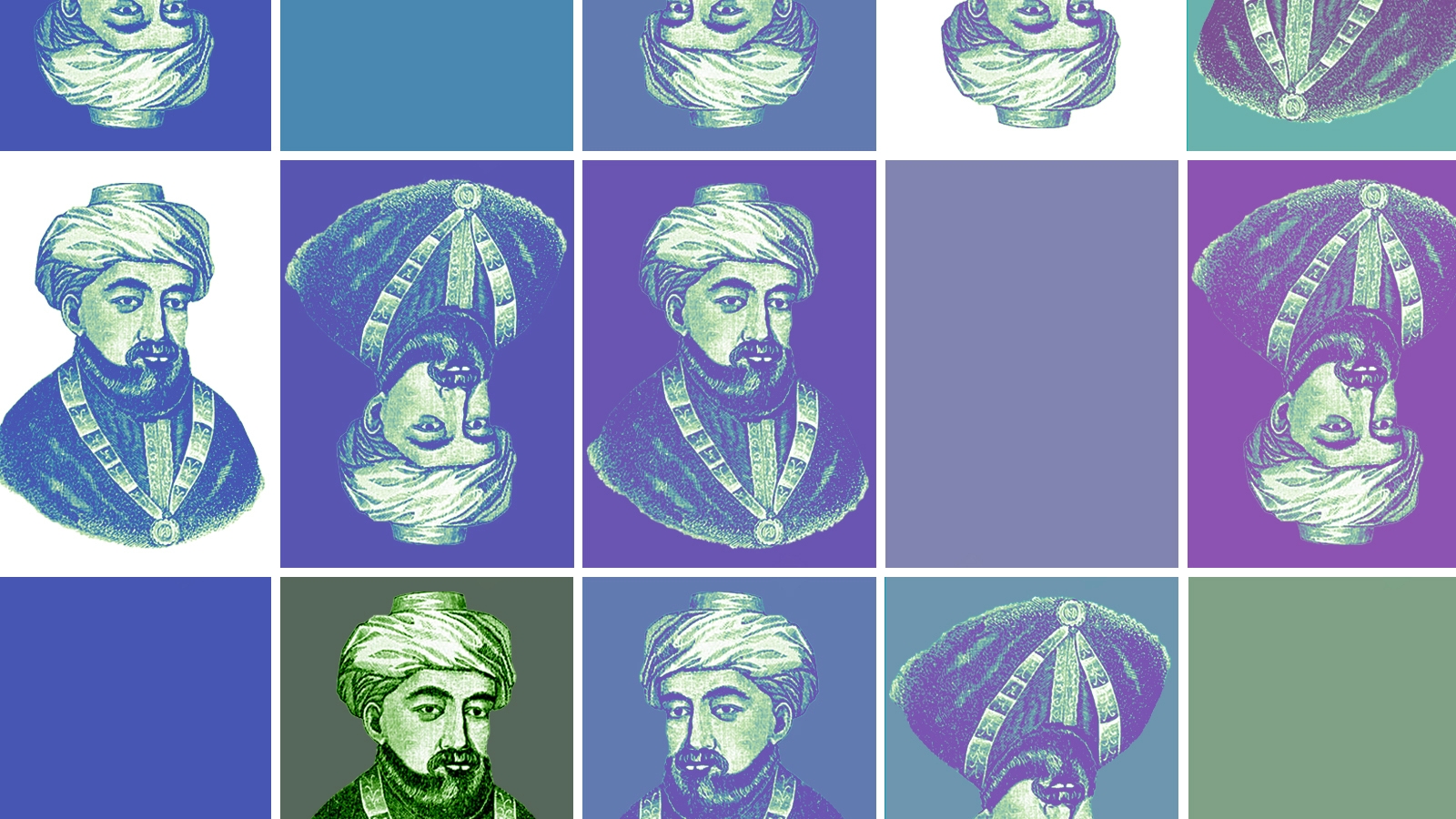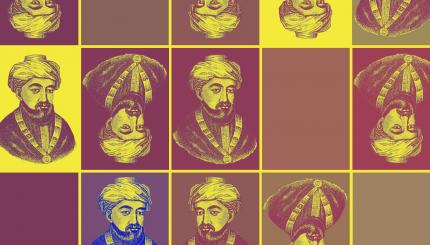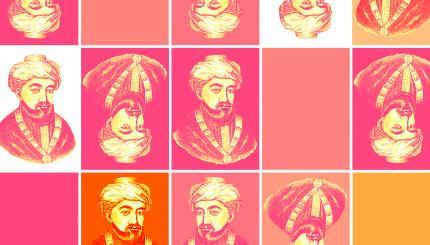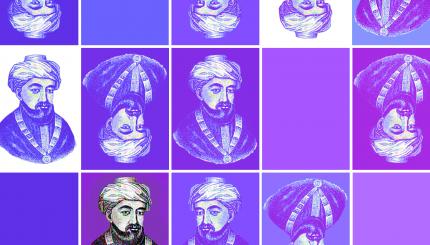Moses Maimonides — known variously as Moses ben Maimon, Rambam, the Great Eagle, and Mūsā b. Maymūn — was a 12th-century philosopher, scientist, physician, religious thinker, rabbinic scholar, jurist, communal leader, and the most famous Jewish figure of the premodern age.
It is a sign of his incomparable genius that modern Spain, Morocco, Egypt, Israel, and Sephardic Jews at large all lay claim to him. By contrast, Maimonides’ rational and humanistic understanding of Judaism has not always found favor among Jews in Ashkenazi lands even though they acknowledge his supreme mastery of Torah.
Maimonides’ published works are pillars of the Jewish canon. But the survival of his formal letters, private correspondence, and documents preserved in the Cairo Genizah, along with references to him in Jewish and Islamic texts, enable us to appreciate the fullness of the man — the doting father and bereaved older brother, the sensitive pastoral counselor and jurist, the highly skilled and sought-after physician, the influential and protective communal leader, the towering public figure, as well as the consummate rabbinic scholar and intellectual visionary.
Maimonides was born in 1138 in Cordoba, al-Andalus, as Islamic Spain was then called. When he was a young lad, the land was overrun and occupied by the Almohads, a Berber dynasty of Islamic revivalists from North Africa who adopted exceedingly harsh policies toward the Christian and Jewish minorities in their realm, including forced conversion to Islam contrary to Islamic law.
With your help, My Jewish Learning can provide endless opportunities for learning, connection and discovery.
Maimonides’ father, a distinguished rabbinic scholar and judge in his own right, seems to have trudged the family around the country in search of safe haven. Somehow, he managed to continue to provide young Moses with a comprehensive rabbinic education, along with advanced instruction in scientific and philosophical subjects. Maimonides sought such wide-ranging education, despite the tumultuous circumstances, out of a belief common to intellectuals in the medieval Islamic world that with proper guidance one could encounter divine wisdom in contemplating the cosmos as well as through revelation and religious practice. Maimonides later famously urged his readers “to hear the truth from whoever utters it.”
Sometime around 1160, the Maimuni family emigrated to Fez, Morocco, then a center of Islamic learning. The evidence suggests that they must have lived for years as crypto-Jews — outwardly feigning adherence to Islam while secretly abiding by Jewish law. In Fez, Maimonides not only continued his study of Torah, science, philosophy and medicine, but also deepened his reading of Islamic law and thought.
Sign up here for “There Was None Like Maimonides,” My Jewish Learning’s email series about the legendary Jewish thinker.
After five years in Fez, the family left for the land of Israel in 1165. Despite the dangers posed by secretly engaging in rabbinic scholarship in Fez, and then the grueling conditions imposed by the journey to Israel, Maimonides continued to labor on his first major work: The Commentary on the Mishnah, seven years in the making and composed in Arabic, his mother tongue, demonstrated Maimonides’ complete mastery of Jewish law and his fusion of it with philosophy.
Palestine was then under Crusader jurisdiction and inhospitable to Jews, so the family did not remain there very long and found refuge in Egypt under the Fatimids, an Islamic polity hospitable to Jews. They settled in Old Cairo, also known as Fustat, where he would remain for the rest of his life.
Maimonides’ early years in Egypt were trying. His father died, making Moses head of the household and responsible for his sisters and brother. He also became embroiled in an internecine Jewish squabble involving a renegade communal leader. But eventually, his fortunes improved. He married a woman from an eminent Egyptian Jewish family and his increasing renown as an authority on Jewish law catapulted him to prominence. Jewish leaders from as far as Provence and Yemen sought his counsel and legal opinions.
Maimonides refused to accept compensation for these communal responsibilities in accordance with rabbinic rulings prohibiting material profit from Torah study. So his younger brother David supported the clan as an international merchant. After David drowned in the Indian Ocean while on a lucrative business trip to India, Maimonides fell into a debilitating year-long depression, describing his loss as “the greatest misfortune that has befallen me during my entire life — worse than anything else …”
Maimonides was appointed head of the Jewish community in 1171 and served in that capacity for several years, representing the Egyptian Jewish community and its interests to the government of a new Islamic dynasty, the Ayyubids, founded by Saladin. He also served as personal physician to the royal court and mixed freely with Muslim political and intellectual elites.
During this period, Maimonides was preoccupied with composing his magnum opus, the Mishneh Torah. This monumental, systematic organization of all of rabbinic law, completed around 1178 and written in his own beautifully rendered register of rabbinic Hebrew, aimed to make Jewish law accessible to all Jews wherever they may live. The Mishneh Torah drew on and fulfilled the plan, first suggested in the Commentary on the Mishnah, to systematize and organize Jewish law. Following that work, The Code also incorporated a set of 13 essential doctrines, later known as Maimonides’ 13 Principles of Faith, that are incumbent on every Jew to uphold. This doctrinal turn, aimed at combating popular forms of idolatry and superstition and calling upon his community to love God with the mind, was so novel, bold, and challenging it became controversial in certain quarters, especially Ashkenazi and adjacent lands such as northern Spain and France.
Despite his medical, communal, and rabbinic responsibilities, and the birth of his son Abraham in 1186, Maimonides nevertheless spent five years working on The Guide of the Perplexed. This magisterial study of the physical and metaphysical secrets inscribed in the Hebrew Bible was addressed to one of his most gifted students and like-minded Jewish intellectual elites confounded by the relationship between Torah, science and philosophy. Even more than the Mishneh Torah, The Guide generated as much controversy as adulation due to suspicions it departed from popular beliefs.
When his Hebrew translator in Provence requested a meeting with him in 1199, Maimonides, 61 at the time, memorably described the draining weekday routine that made any such visit impossible. He relates that he returned home after spending much of the day serving at the sultan’s palace to “find the antechamber filled with people, both Jews and Gentiles, nobles and common people, judges and bailiffs, friends and foes…patients go in and out until nightfall and sometimes even…until two hours and more in the night. I converse and prescribe for them while lying down from sheer fatigue, and when night falls, I am so exhausted that I can scarcely speak.”
Maimonides died in Cairo in 1204. Throughout his life, he steadfastly identified himself as Sephardic/Andalusi and he remained unceasingly loyal to the rabbinic, intellectual, and scientific traditions of his place of origin. His son, Abraham Maimuni, succeeded him as leader of the Egyptian Jewish community, as a physician, learned rabbinic authority, profound religious thinker, and guardian of his father’s incomparable legacy.



